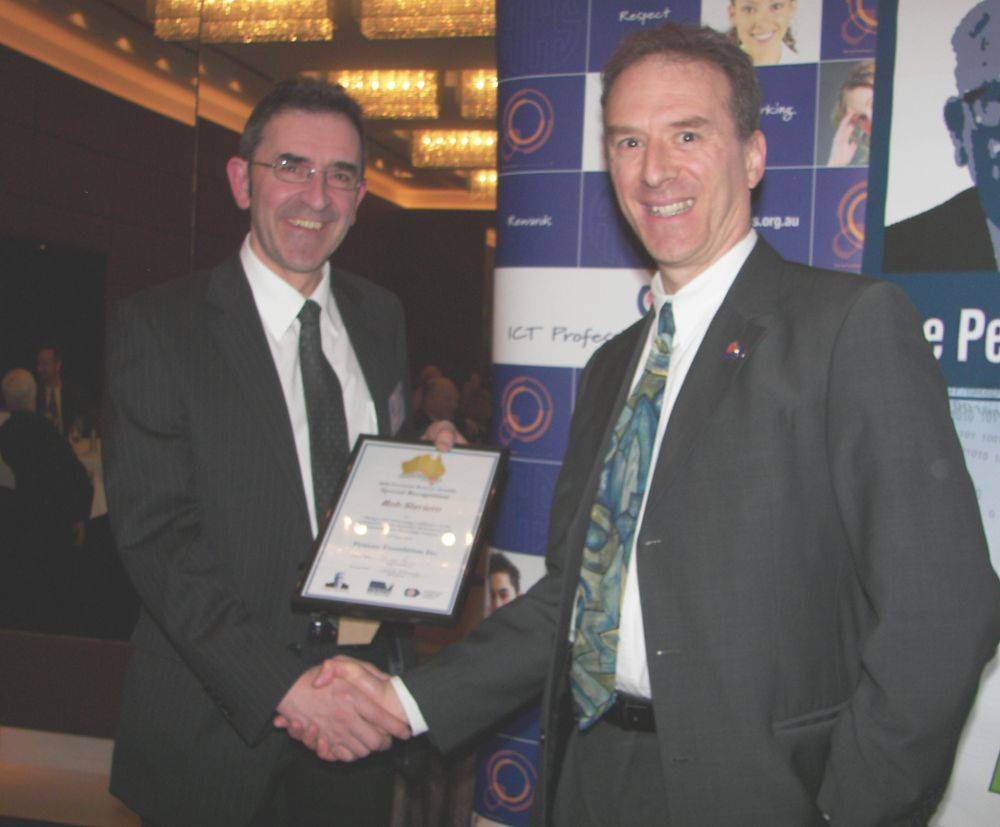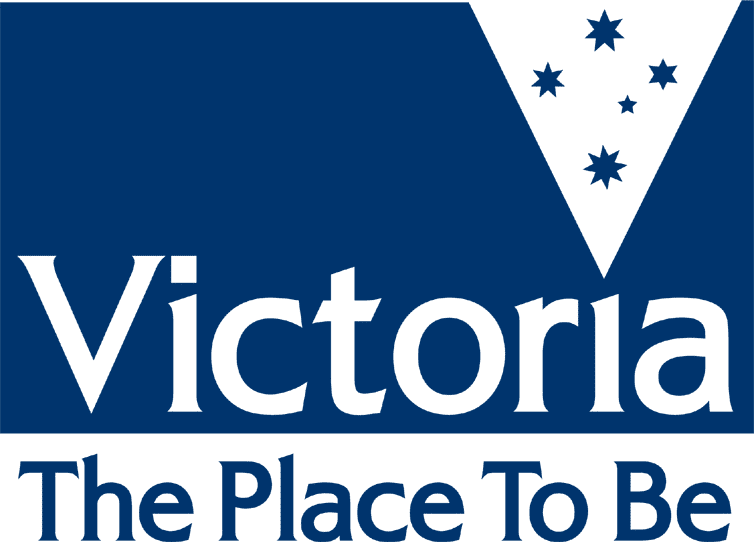2010 Vic Award
The 2010 Victorian State Pearcey Award was presented to Mr Brett Paterson as part of the the Victorian ACS Fellows dinner on Tuesday 22nd June 2010 at the RACV Club in Melbourne. The event was sponsored by Multimedia Victoria, Department of Innovation, Industry and Regional Development and the Australian Computer Society.
In presenting this year's award, Tony Lupton, MP, Cabinet Secretary for the Victorian Government, commented on the diligence of Brett and his company to grow to international significance. Brett's company is the world leader in game audio engine technology with approximately 30% of the world's console games using his technology. Secretary Lupton said Brett Paterson is a great example of "taking a risk and making a difference" in the Victorian ICT community and is a great icon for young enthusiasists wishing to make a career in the rapidly growing ICT software industry.
Brett Paterson
Brett founded his company in 2002 and has built world-class audio middleware called FMOD that allows game developers to create music and audio affects. His client list includes the who's who of the global games industry and his software has over 30% share of the world market, regularly beating out well funded USA competitors. He has bootstrapped the company himself (now about 12 people) and the company continues to grow. Brett is a pre-eminent expert in the game audio field as well as very successful entrepreneur.
Brett Paterson and FMOD
During University and early employment, Brett spent many years writing an audio player called FMOD. By 2002, FMOD was generating a small income, so Brett decided to start his company FireLight Technologies. This enabled his PC-based sound library to be expanded to also run on the 3 main gaming console platforms: PlayStation 2, Xbox and GameCube. With some generous local assistance of the game company, Bluetongue, in an incubator style arrangement, Brett and his partner, Andrew Scott grew the base product.
As more companies used FMOD, the company and reputation grew which in turn enticed other companies, notably the hugely popular game World of Warcraft. Brett ensured FMOD had a profile on the world stage, such as exhibiting at the annual GDC (Game Developer Conference) with a significant booth to get the message out about their tool. In the early years, Brett had to juggle his time between programming. organizing events and customer support.
Over time Brett saw the limitations of the FMOD audio engine, and decided to rewrite from scratch a new product called FMOD Ex with the aim to support more platforms and have greater flexibility. Brett was in charge of writing a new flexible system that could handle the most demanding audio requirements, and Andrew took on the task of developing a sound designer tool that gave FMOD a new audience - audio artists and musicians, rather than just programmers which was our original target audience.
Apart from overcoming enormous technical challenges, Brett's commercial approach proved to be a winning formula - making the FMOD engine and support generally free, but taking a per game license fee on commercial products. The new FMOD Ex resulted in FMOD's userbase rapidly growing since 2007 which has allowed FMOD to gradually take on more employees (currently 12 full-time and many contractors).
Firelight Technologies business has grown to dominate the audio engine market for games, and is also used in government and auto industry simulators. Even NASA uses FMOD now. Brett still acts as chief 'software architect' for the programmer API while other staff handle the many other tasks to do with the sound designer interface, so Brett is very hands-on in the programming side of the company, while also running the day-to-day business and working with staff.
The games industry is turning over 15-20 billion dollars a year now and is constantly growing. FMOD now has a firm grasp of this market with a surveyed 34% share of audio tools used in games companies. Brett hopes to capture even more of it with new innovations, new technology and new ways to integrate with other technologies.
Special Recognition Award presented to Robert Slaviero
 Photo:
Robert Slaviero and Rick Harvey
Photo:
Robert Slaviero and Rick Harvey
A special recognition award was presented to Robert Slaviero for his outstanding contributions to the ICT industry. In presenting the award, Rick Harvey, chairman of the Victorian Pearcey Foundation, commented on Robert's extraordinary contributions to the electronics industry including representing Australia on international committees and conferences, publishing of research papers, and being a highly active advisor, guest lecturer and mentor in Victoria.
At work, Robert is currently Managing Director of Analog Devices Australia (ADA) Pty Ltd which specializes in the development of embedded Digital Signal Processing (DSP) software. Over his 25 year career, Robert has worked on the development of numerous commercial products including telecommunications and multimedia products, data communications test equipment, modems, multiplexers, medical, security and avionics equipment.
In industry, Robert is presently the Chapter Chair of the Victorian IEEE Signal Processing Society (02-10) after spending many years running the IEEE Victorian Section including Chair (99-01), Vice-Chair (96-98) and Secretary (95-98). He has also been on the organizing committee and technical review committee of various local and international conferences and served on a number of academic, government and industry advisory boards and committees.
More generally, Robert is a Fellow of the Australian Institute of Management (AIM), a senior member of the Institute of Electrical and Electronics Engineers (IEEE), and a member of the International Neural Networks Society (INNS), the Association of Professional Engineers, Scientists and Managers of Australia (APESMA), the Licensing Executives Society of Australia and New Zealand (LESANZ), and the Australian & New Zealand Association for the Advancement of Science (ANZAAS).
Academically, Robert has qualifications in engineering, business and law. Specifically, a Bachelor of Engineering Degree in Electronics Engineering (RMIT), a Post Graduate Diploma in Digital Computer Engineering (RMIT), a Post Graduate Diploma in Management Systems (Swinburne), a Master of Business in Information Technology (Swinburne) and a Post Graduate Diploma in Intellectual Property Law (Monash).
Sponsors
The Pearcey Foundation is most appreciative of the generous support given by Multimedia Victoria, Department of Innovation, Industry and Regional Development and the Australian Computer Society.
- Australian Computer Society
- Multimedia Victoria - State Government of Victoria (Now DSDBI)



